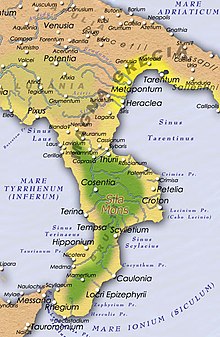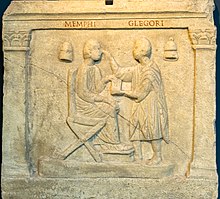Legio Campana
The legio Campana was a partial military contingent of the Roman armed forces to be set up by the Campanian city of Capua due to its status as a municipality , which was mobilized by the Roman Republic because of the Pyrrhic War . The unit consisted primarily of the young team from the city of Capua and from the Campania region. The Roman consul carried out the supreme command of the armed forces and thus also the authority over the Campanian legion . The name legio Campana is only passed down in a synopsis in Titus Livius . Orosius calls it legio octava .
background
In addition to the Greek settlements of Thurioi and Lokroi , the city of Rhegion asked the Romans for protection from Pyrrhos I and for assistance against possible intervention ambitions on the part of the Carthaginians . By the consul Publius Valerius Laevinus , probably around 282 BC. BC, the Campanian Legion was placed in the city as a protective power and thus as a guarantor for the protection of Roman interests, also against the then ally Carthage. Contrary to expectations, however, the city of Rhegion did not initially become the target of the war.
Rhegion
Polybios and others report that the commander Decius Vibellius, out of greed of the city, settled in around 280 BC. BC. The nobility of Rhegion was put down at a banquet and the male population fit for military service afterwards. The survivors and their possessions were distributed among the unit as loot. The commandant is said to have legitimized the procedure to his subordinates in advance through fictitious correspondence between the city leaders and Pyrrhus, which dealt with the surrender of the city and the surrender of the crew to them, and thus dispelled any concerns. This pretext was probably not questioned, since such incidents had occurred in other Greek cities with Roman occupations in the recent past. The course of the Pyrrhic War absorbed all of Rome's attention. The rebels therefore did not have to fear early intervention by the Romans.
Thus unmolested by Rome, an autarkic regime had been established within a decade. An alliance was formed with the Mamertines in order to wage cooperative wars against neighboring cities in the Calabria region. The mercenary army from Campania had attacked in 288 BC. BC seized the city of Messana in Sicily . They had proceeded in a similar way as their compatriots later in Rhegion.
According to the older sources in Polybios, it was not possible for the Romans to immediately relieve the city of Rhegion, as their armed forces were tied up due to the war. From Zonaras however, it appears that Rome tolerated this development initially. It was a fact that the Mamertines in Messana had a close alliance with the occupation of Rhegion and, through their joint military actions, successfully prevented Pyrrhus from establishing themselves in this region. Only when the city of Croton was captured and destroyed by the Campanians after the end of the Pyrrhic War did the Roman Senate feel compelled to take consistent action against the occupiers of Rhegion.
As a result, Rhegion became around 271 BC. Besieged under the consul Lucius Genucius Clepsina . After long struggles, which were waged with the support of Hieron II of Syracuse , the later consul Gaius Genucius Clepsina succeeded in taking over the city in 270 BC. And to put the residents and returnees in their original rights.
In Rhegion, the proportion of captured mercenaries was executed who were presumably recruited from allied Marmertines and who did not belong to the Legio Campana . The soldiers of the Campanian Legion were brought to Rome, where they were sentenced to death by the ax under customary law applicable to the Roman military . In the Roman Forum , despite invoking the right to provoke , those who were judged were publicly scourged and beheaded. A protest by the tribunes , who saw the legal protection bypassed, was rejected. The number of legionaries and officers judged on six days is given as 300 men.
The number of 4,000 delinquents reported by Titus Livius who are said to have been executed in Rome must be viewed in the context of a revolt by Roman soldiers in the Second Punic War and an address by Scipio to them. The general here consciously shows the person affected from a similar, past event, the severity to be expected and the possible extent of the punishment.
Decius Vibellius
The management of the Legio Campana was entrusted to Decius Vibellius . This knight came from a noble family that was probably settled in Capua. Diodorus reports that the former commander of the Legio Campana was no longer present when the Romans took the city. According to this, Decius Vibellius is said to have left Rhegion some time ago due to a rebellion directed against him and to have taken his residence in the allied city of Messana. An eye disease is said to have caused him to seek medical help. Not knowing that he was being treated by a doctor born in Rhegion, he innocently endured extremely painful therapy. The healer, presumably in revenge, had put a very irritating tincture in his eyes, which made Decius Vibellius blind.
After the Romans took the city of Rhegion, Decius Vibellius was extradited by the Mamertines to be judged in Rome. While in custody, he evaded his punishment by suicide.
The Legio Campana in historiography
The size of the Legio Campana is given by Polybios in legion strength, with about 4000 combatants. Dionysius of Halicarnassus speaks of two garrisons and figures the first occupation of the city of Rhegion with 1200 soldiers, which consisted of 800 Campanians and 400 Sidiciners . The second crew then took place with a legion of 4,500 men after the first troop had subjugated the city and murdered or expelled the population. The consul Gaius Fabricius Luscinus is believed to have made Rhegion around 278 BC. Horrified and the ringleaders were punished. Following the example of their predecessors, the following garrison seized the city and made a second campaign against Rhegion necessary.
In a more recent treatise it is thought possible that the Legio Campana mentioned in the sources could in fact have been a self-sufficient mercenary force independent of Rome. The mercenary army from Campania was recruited to protect the Greek Rhegion from attacks by the Bruttians . This southern Italian tribe was allied with Pyrrhos and had in the early 3rd century BC. Some of the Greek cities on the coasts already conquered. The garrison in the wages of the city of Rhegion took advantage of the chaos of war that followed to offend and exploit the inhabitants. Rome benefited from the takeover of the city by the Campanians that the alliance established between the neighboring Mamertines in Sicily and their compatriots in Rhegion considerably restricted Pyrrhos in its military capabilities. After its withdrawal from Italy and with the fall of Taranto , Rome was able to exercise unchallenged control over the Italian mainland. It now took on the city of Rhegion, as the regime there had developed into a regional power that was sensitive to the interests of Rome.
Remarks
- ^ Theodor Mommsen: Roman State Law. Volume 3, 1. S. Hirzel, Leipzig 1887, pp. 586, 587; Wilhelm Simshäuser : Juridici and municipal jurisdiction in Italy . Verlag CH Beck, Munich 1973, p. 37
- ^ Livy, periochae 15.
- ^ Orosius, Historiae adversus paganos 4, 3, 4.
- ↑ Polybios, Historien 1, 7, 1–13.
- ↑ Polybios, Historien 1, 7, 7–8; Dionysius of Halicarnassus, Roman Early History 20, 4, 6–8; Appian, Samnitica 9, 1 (fragment 39).
- ↑ Dionysius of Halicarnassus, Römische Frühgeschichte 20, 4, 4–6.
- ↑ Polybios, Historien 1, 7, 9; Cassius Dio, Roman History , Fragment 40, 7-12.
- ↑ Polybios, Historien 1, 7, 2–5; Appian, Samnitica 9, 1 (fragment 39).
- ↑ Polybios, Historien 1, 7, 2–9.
- ↑ Zonaras, Weltgeschichte 8, 6.
- ↑ Polybios, Historien 1, 7, 10–13.
- ^ Theodor Mommsen : Roman criminal law . Duncker & Humblot, Leipzig 1899, p. 43 (digitized version)
- ^ Valerius Maximus : Facta et Dicta Memorabilia, DE DISCIPLINA MILITARI 2, 7, 15
- ↑ Polybios, Historien 1, 7, 11–12; Orosius, Historiae adversus paganos 4, 3, 4-6.
- ^ Titus Livius, ab urbe condita 28, 28, 3 ( German translation ).
- ↑ Appian, Samnitica 9, 1–3 (fragments 39–41) ( German translation p. 39)
- ↑ Polybios, Historien 1, 7, 7; Diodor, Bibliothéke historiké 22, 1, 3.
- ^ Diodor, Bibliothéke historiké 22, 1, 2 and 3.
- ↑ Dionysius of Halicarnassus, Römische Frühgeschichte 20, 5, 2–3; Appian, Samnitica 9, 2 (fragment 40); Diodor, Bibliothéke historiké 22, 1, 2 and 3.
- ↑ Dionysius of Halicarnassus, Römische Frühgeschichte 20, 5, 5; Appian, Samnitica 9, 3 (fragment 41).
- ↑ Polybios, Historien 1, 7, 1–13.
- ^ Dionysius of Halicarnassus, Römische Frühgeschichte 20, 4, 2.
- ^ Dionysius of Halicarnassus, Römische Frühgeschichte 20, 4–5.
- ↑ Dionysius of Halicarnassus, Römische Frühgeschichte 20, 16, 1–2.
- ↑ Bruno Bleckmann: Rome and the Campanians of Rhegion. In: Chiron 29, 1999, p. 144.
swell
- Polybios : Historien , Book 1, 7, 1–13
- Dionysius of Halicarnassus : Early Roman History , Book 20
- Titus Livius : ab urbe condita , book 24, 8 , books 12 and 15 , book 28, 28 , book 31, 31
- Diodor : Historical Library , Book 22
- Orosius : Historiae adversus paganos , Book 4, 3, 4–6 ( English translation )
- Zonaras : World History , Book 8, 6-14
- Appian , Samnitica 9, 1–3 (fragments 39–41) ( translation )
- Cassius Dio , Roman History , Fragment 40, 7-12
literature
- Bruno Bleckmann : Rome and the Campanians of Rhegion. In: Chiron 29, 1999, pp. 123-146 ( excerpts online ).
- Klaus Bringmann : History of the Roman Republic. From the beginning to Augustus. The war with King Pyrrhus. CH Beck, Munich 2002, reviewed a. extended new edition 2017, ISBN 3-406-49292-4 , pp. 87–92.
- Wilhelm Simshäuser: Juridici and municipal jurisdiction in Italy . Verlag CH Beck, Munich 1973, ISBN 3-406-00661-2 , pp. 35-38 ( excerpt online ).
- Karl Julius Beloch : Greek History. Volume 4, 2: The Greek world domination. De Gruyter, Berlin and Leipzig 1927, pp. 479–484 .
- Theodor Mommsen : Roman constitutional law. Volume 3, 1. S. Hirzel, Leipzig 1887, p. 586 f. ( Digitized version ).
- Michael Fronda: Between Rome and Carthage. Southern Italy during the Second Punic War. Hannibal`s incomplete success: Rhegion . Cambridge: University Press, 2010, ( excerpts online ).



